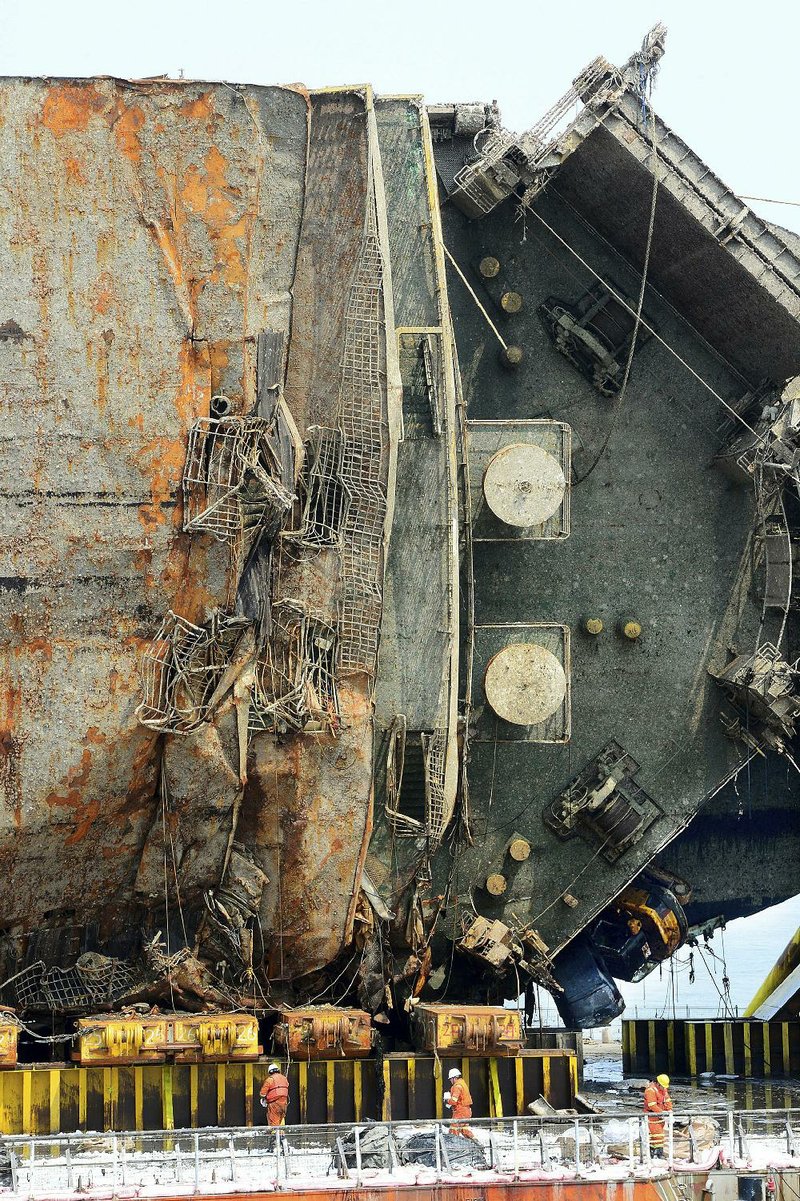Ferry-wreck bones found to be animals’
SEOUL, South Korea — Bones found near the wreckage of a South Korean ferry belonged to animals, not missing passengers from the ship’s 2014 sinking in which more than 300 people died, the government announced in a reversal Tuesday.
The Ministry of Oceans and Fisheries had said earlier in the day that salvage crews had found bones measuring 1.5 to 7 inches that were likely from one or more of the nine missing passengers, and that DNA tests would be used to verify the identities.
But hours later, investigators from the National Forensic Service concluded after inspecting the bones that they were from unidentified animals, not humans.
The government, which has been widely criticized over its handling of the disaster, did not immediately explain how the mistake occurred.
Workers have completed an operation to lift the corroding 6,800-ton Sewol ferry from the sea, and recovering the remains of the missing victims would put the country a step closer to finding closure to one of its deadliest maritime disasters.
Cyclone batters Australia’s northeast
TOWNSVILLE, Australia — Residents of Australia’s cyclone-battered tropical northeast emerged from their homes today to find roofs lying in their yards and roads blocked by tangles of fallen trees and power lines.
Cyclone Debbie, which slammed into the coast of Queensland state on Tuesday with winds up to 160 mph, weakened quickly as it moved inland and was downgraded to a tropical low early this morning.
Australia’s military sent vehicles, aircraft and supplies to the region, and cleanup efforts were expected to begin later today. About 60,000 houses were without power, and several communities remained isolated with no access to communications. Emergency workers were trying to reach those areas to ensure residents were safe, Queensland Police Commissioner Ian Stewart said.
“Nature has flung her worst at the people of north Queensland,” Prime Minister Malcolm Turnbull told reporters. “It is now our job to make sure that every agency pulls together … to provide support to the people of north Queensland who have had a very tough day and night.”
There were no reports of deaths from the storm.
U.N. experts’ bodies thought to be found
DAKAR, Senegal— Three bodies, including those of a male and female Caucasian, have been found in Congo’s Central Kasai province and are suspected to be those of U.N. experts who disappeared there two weeks ago with colleagues, the government said Tuesday.
Congolese spokesman Lambert Mende told Top Congo FM that the bodies were found Monday but did not confirm whether they were those of Michael Sharp of the United States and Zaida Catalan of Sweden.
“To our knowledge, there are no other foreigners who have disappeared in this region,” Mende said, adding that the provincial commissioner was on his way to recover and identify the bodies of two Caucasians and a Congolese.
A United Nations spokesman in New York said the U.N. was analyzing the remains and could not yet confirm the identities of the dead.
Sharp, Catalan, interpreter Betu Tshintela, driver Isaac Kabuayi and two motorbike drivers disappeared March 12 in Central Kasai while looking into recent large-scale violence and alleged human-rights violations by the Congolese army and area militia groups.
U.S. backs Montenegro’s NATO entry
WASHINGTON — Montenegro is set to become NATO’s newest member after the U.S. Senate voted overwhelmingly to ratify the tiny Balkan nation’s entry into the alliance.
Senators voted 97-2 on Tuesday to admit Montenegro, with only Republican Sens. Rand Paul of Kentucky and Mike Lee of Utah voting “no.” Paul had suggested that adding Montenegro could lead to heightened tension with Russia.
President Donald Trump must give final approval to complete the United States’ ratification. The only other NATO member that still needs to approve the application is Spain.
Despite its size, Montenegro bears strategic importance. A former ally of Russia, the country is in the midst of a clash between the West and Russia over influence in the Balkans. Montenegro’s membership gives NATO a contiguous border along the Adriatic coast.
Montenegro would become the 29th member of the alliance. NATO invited Montenegro to start entry talks in December 2015, roughly nine years after the nation of 620,000 people split with Serbia in a 2006 referendum.
